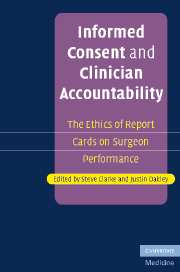Book contents
- Frontmatter
- Contents
- List of contributors
- Acknowledgements
- Introduction: Accountability, informed consent and clinician performance information
- Part I Accountability
- Part II Informed consent
- Part introduction
- 7 Informed consent and surgeons' performance
- 8 The value and practical limits of informed consent
- 9 Against the informed consent argument for surgeon report cards
- 10 Trust and the limits of knowledge
- 11 Surgeons' report cards, heuristics, biases and informed consent
- 12 Report cards, informed consent and market forces
- Part III Reporting performance information
- Index
- References
9 - Against the informed consent argument for surgeon report cards
Published online by Cambridge University Press: 08 August 2009
- Frontmatter
- Contents
- List of contributors
- Acknowledgements
- Introduction: Accountability, informed consent and clinician performance information
- Part I Accountability
- Part II Informed consent
- Part introduction
- 7 Informed consent and surgeons' performance
- 8 The value and practical limits of informed consent
- 9 Against the informed consent argument for surgeon report cards
- 10 Trust and the limits of knowledge
- 11 Surgeons' report cards, heuristics, biases and informed consent
- 12 Report cards, informed consent and market forces
- Part III Reporting performance information
- Index
- References
Summary
The publication of outcomes information, or ‘report cards’, for individual surgeons can be argued for on three distinct grounds. One kind of argument appeals to healthcare quality, and focuses on the value of individual performance auditing for patient safety and for an evidence-based approach to best practice. A second kind of argument constructs the patient as a healthcare ‘consumer’ and appeals to a notion of consumer rights, such that patients have a right to comparative information about the healthcare products and services that they consume. Some proponents of this kind of argument believe that enabling patients to be more informed consumers will introduce productive market incentives into the healthcare system. A third kind of argument appeals to respect for patient autonomy and the requirement of informed consent to any medical intervention. I will refer to these arguments, respectively, as ‘the argument from quality’, ‘the argument from consumer sovereignty’ and ‘the argument from informed consent’. In advocating the publication of surgeon-specific outcomes data, it matters which argument we take to be fundamental, because the basic rationale for having surgeon-specific report cards has implications for the form, content and funding of such a system.
With respect to the argument from quality, the literature examining the effect of public reporting of comparative performance information on healthcare quality presents an increasingly compelling argument that such reporting is necessary for sustainable quality improvement (Chassin, 2002; Marshall et al., 2002).
- Type
- Chapter
- Information
- Informed Consent and Clinician AccountabilityThe Ethics of Report Cards on Surgeon Performance, pp. 147 - 156Publisher: Cambridge University PressPrint publication year: 2007



